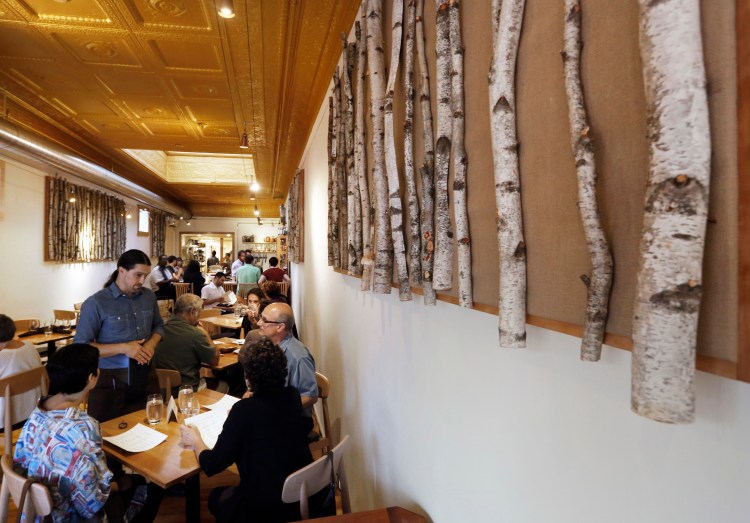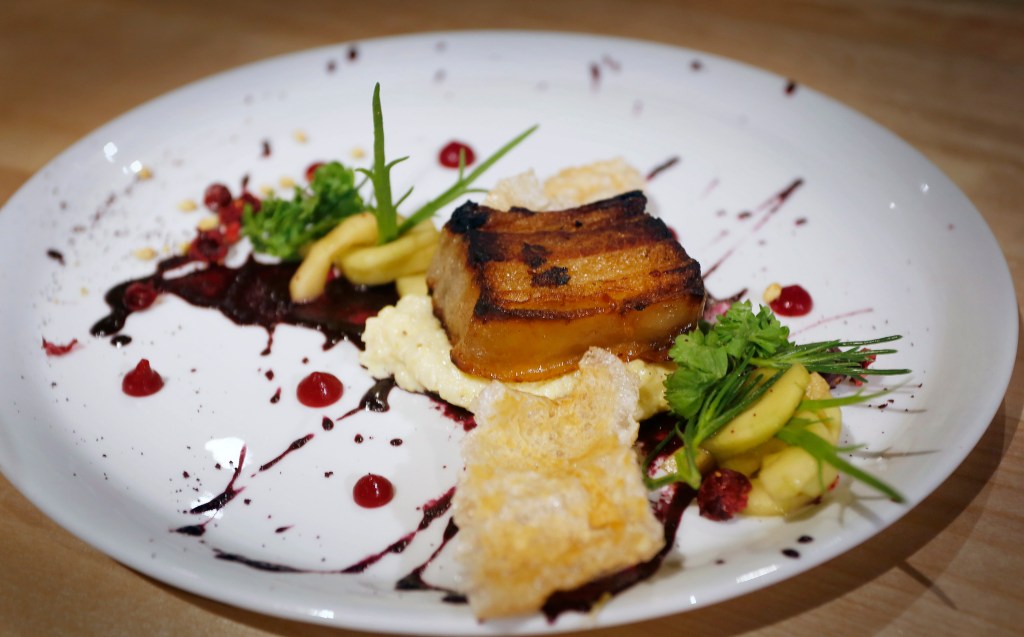Walking into Vinland on a windy, warm Tuesday night, I’m feeling anticipation in my chest – as if I were entering a guerrilla hangout in Mexico City during the time of Che Guevara. I’ve just read chef David Levi’s much-debated 19-point manifesto, which states, among other things, “The industrial food system produces bad food. It tastes bad and it is bad for us. It is not real food…. We are part of a revolution, which is part of a broader revolution of our time, a revolution in consciousness, politics and society. It is meaningless to seek good nourishment while perpetuating an economy that is killing the earth.”
The restaurant’s website also states, more to the point, though no less incendiary, “Vinland is the first restaurant in the world to serve 100 percent local, organic food.” Growing up around a similar breed of food insurgents, I’ve learned to reserve judgment on declarative statements and instead let the food speak for itself. But I can’t help feeling that old thrill of possibility – maybe, as Maine Farmland Trust President John Piotti recently outlined in a trust member publication, Maine can feed itself. Maybe this is it – a local movement that will change the world (!).
If the healthily attractive crowd filling the brightly comfortable space on Congress Square is concerned about the evils inherent in the industrial economy, it doesn’t appear to be hindering their enjoyment of dinner, though they seem so happy, and well, normal, that I wonder if perhaps they’re a cover, or maybe just an incredibly happy and normal cross section of locavores.
The bartender, Adrian, as healthily handsome as the surrounding diners, greets me at a native Maine yellow birch counter surrounded by birch-branch wall decorations. Levi and his sous chef are busy in the open kitchen beyond, and a large domed skylight in the antique tin ceiling adds something of a god’s-eye effect to the whole scene.
Adrian explains the homebrew-looking bottles with tape labels as vermouths made in-house from Oyster River wine aromatized with local wormwood and herbs and fortified with Bartlett brandy. He adds that the drinks on the cocktail menu trend toward naturally sweet rather than syrupy, since sugar is not produced in Maine. I find the After the Storm, made with local Ration rum, a homemade ginger brew with maple syrup and yogurt whey in place of citrus (also not grown in Maine) preferable to a standard Dark and Stormy. The house “limoncello,” from vodka, basil, lemongrass, calendula and honey, is both surprisingly high in alcohol content and a non-cloying improvement on the original.
When my guest, Don Lindgren, arrives, there’s a reverent nod among the staff as we’re led to our table (crafted from salvaged Maine hardwood by Marc McCabe). Don, with his wife, Samantha, is the owner of Rabelais in Biddeford, recently dubbed “the best cookbook shop in America” by Bon Appétit, and whose networking with national editors has helped garner Portland’s über-foodie accolades.
Don has Scandinavian roots and admits to reading the recent literary sensation “My Struggle,” by the rugged and bushy-eyebrowed Karl Ove Knausgård, to whom Don bears something of a resemblance. Don is also the kind of guy who has taken food history seminars at Harvard, and is an encyclopedia of information about old cookbooks and all things food.
“I like to find out what’s in a chef’s mind and see if they’re any good at getting it on the plate,” Don tells me, as we inspect the menu.
Our deliberation over the gluten-free small-plates medley is simplified by the choice of a five-course tasting ($60) for both of us, which our waiter, Dylan, who also possesses healthy good looks, will orchestrate. (You must reserve ahead for Levi to prepare an eight-course menu for $90). Levi sends out a sampling of lobster pieces topped by tangy saltwort, before what seems like an endless stream of beautifully displayed dishes begins to parade across our table.
“He’s not sacrificing flavor for his manifesto,” Don says right from the start, over the seemingly simple offering of raw vegetables in herbed pork lardo ($4), and beet chips with herbed chevre ($4). We find ourselves inspired to dump the vegetables onto a plate so as to more fully saturate them in the lardo at the bottom, and then use our fingers to polish off the last of it. The artful beet chips complement with a dash of sweet and hearty.
“He’s succeeded in making me think that there are other ways of getting certain flavors into dishes,” Don adds. “People have been eating saltwort and other foraged foods for millennia, but he’s adding a modern presentation and bringing out new flavors. It’s high-concept, but nature-based.”
Next comes a bisque of green crab ($14, and a good end for an invasive species) and summer salad ($9) splashed with orange calendula petals and translucent white radish slivers. After that comes the Portland strip steak ($18) with parsnips and parsley gremolata, plus a pork capocollo ($14) with cranberry sauce and a cabbage and potato side.
“You see certain ingredients repeating themselves, peas, radish, purslane, parsnip, beets,” Don says as we work our way through the selections. “It doesn’t feel like repetition, but what’s in season. I wonder what the menu was like two months ago in April and May, and what will it be like two months from now?”
As in any creative endeavor with limits, the limitation is often what produces the magic to overcome and surpass. The beef chuck tender ($13) with bitter chicory, cranberry emulsion and griddled tomato, and the pork belly ($14) with grits and a vinegary blueberry gastrique are my favorites in a meal in which everything builds on itself to leave you perfectly satisfied, yet energized. Even a dessert of honey ice cream ($8) and a mascarpone sandwich cookie ($2) doesn’t seem sinful.
I overhear a diner next to us say to his date, “This was a memorable meal, and I don’t often say that.”
For whatever reason, Levi’s Vinland seems to inspire grand declarative statements, including John Golden’s Golden Dish review by way of Sean Wilkinson’s reading of it on Facebook. Maybe such vital, Nordic-influenced food brings out one’s inner Viking. I find myself tempted to add my own lofty aggrandizements, but I’ll say only that I was delighted enough by the experience to want to try harder to eat mostly foods produced in Maine. If we all made this effort, the result could indeed be revolutionary.
As I turn down High Street toward my car, I run into none other than Joe Ricchio, the well-loved food guru at Maine magazine.
“If it isn’t Five-Star Coleman,” he teases me over a hug, in reference to my giving a five-star review to a diner.
“It’s about the quality of the food, not the style of restaurant,” I say.
“Whatever you do,” he tells me confidentially, pointing in the direction of Vinland. “Never review that place.”
Of course I don’t tell him I plan to give it five stars.
Up Next: On finding redemption with author Ann Hood.
Melissa Coleman is interim restaurant reviewer for the Maine Sunday Telegram. Each week, she takes a writer or food expert to dinner with her to provide additional perspective. Coleman writes for national and local publications and can be found at melissacoleman.com. Her memoir, “This Life Is in Your Hands: One Dream, Sixty Acres, and a Family’s Heartbreak,” is about coming of age during the 1970s back-to-the-land movement.
Send questions/comments to the editors.





Comments are no longer available on this story